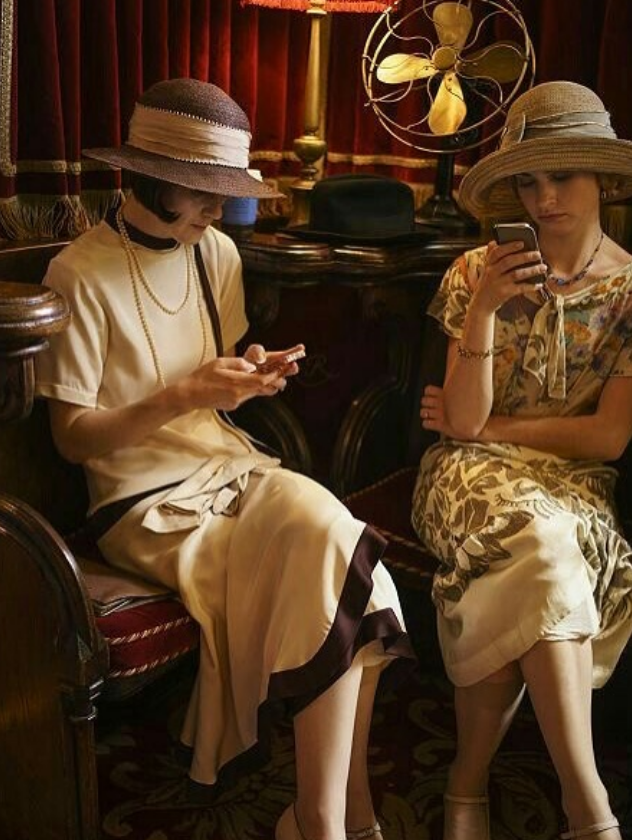Digital Detox
Playing hermit is becoming an appreciated, if not an applauded art. Surrounded by bots, wires, plugs, sockets, gadgets, and other tell-tale paraphernalia of the technocratic age, people gravitate more and more towards retreating, retiring, and recharging. And as they do so, the stuff they leave behind begins to stir.
Michelle Dockery and Lily James on the set of Downton Abbey (2010-2015). Is the past interrupted by the future? Or is the present anxious about its relation to the lax yesterday and the tense tomorrow? Image available via Instagram, @downton._abbey. © All rights belong to their respective owners. No copyright infringement intended.
If the word ‘lifestyle’ used to refer to a mode of living, today the denotation has shifted closer to the French cognate mode, or fashion. Indeed, lifestyles can be fashionable and unfashionable; well-fashioned; old-fashioned; and out of fashion altogether (which, of course, inevitably ties lifestyles to the concept of fashion all over again). Just as with clothes, haircuts, and skincare, habits and so-called hacks can suddenly erupt into popularity and race to the top of various ‘trending now’ lists.
For example, I looked up ‘lifestyle trends 2025’ online. I was overwhelmed by AI summaries, articles, blog posts, and short videos about choices that “reflect the shifting priorities of individuals and societies”, as Forbes puts it. In addition to mindfulness, sustainability, and presence, there seems to be an increased interest in digital detoxing. This practice consists mainly in limiting or completely abstaining from social media, digital devices, or any kind of blue light for a specially designated period of time.
Kirsten Dunst and Jason Schwartzman on the set of Marie Antoinette (2006). The two actors take a break from historicity and period drama. Now, our drama is all about breaking back into historicity. Image available via Instagram, @2000sanxiety. © All rights belong to their respective owners. No copyright infringement intended.
With digital detoxing, the promise of peace and quiet is perhaps the most appetising factor. “As a society, we’ve never been more reachable”, says Sophie-Claire Hoeller, Vogue. “Increasingly, true luxury is being fully offline: being completely unreachable is the ultimate power move”. Alas, too true. Going offline fully is a prerogative that has to be planned in advance and agreed upon with one’s friends, family, and especially colleagues. But, if the ‘ultimate power move’ isn’t actually realistic, intermittent mobile fasting can go a long way, too.
What’s actually curious about digital detoxing, though, is the way it redefines life and organic matter. Detoxing – or, detoxification – is a term that’s associated most strongly with medicine, healthcare, and bodily processes at large. Toxins, as we find in the OED, are substances that are harmful or dangerous to life; specifically, poisons and chemicals that are secreted by living organisms and cause illness or death to other organisms. Like Salmonella and worms releasing toxins in the stomach, for instance. Well, then, if we speak of digital detoxing, we are unconsciously attributing livelihood to the digital realm. Screens, phones, social media, apps, and the whole lot of it are not just items that clutter our space. They are bacteria-like agents that impinge on the limits of our own livelihoods.
We feel poisoned by this collective cell organism, cyber organism, cyborg. Swiping for the ‘Do Not Disturb Mode’, or ‘Airplane Mode’, or unplugging completely, we are trying to remove toxic objects from our confines. Once again, we look inside the OED, and once again we find something revealing. The Latin prefix ‘de-’ in ‘detox’ means to take something off, put something aside; to throw away from oneself; to do something or strip something down to the bottom, completely, to exhaustion, to the dregs; to undo, to reverse, to deprive an action of its primary characteristics. With our minds turned to digital de-toxing, we no longer think of the digital as mere technology. Instead, it rises before us as an Other, a life form that comes in contact and grapples with the Self — our own life form. We feel intoxicated, overwhelmed, disoriented, stoppered, blocked. So we thwart and thrust aside, go back to bare essentials, away, down to the bottom. We try to undo and reverse the damage of Phonella, MacBookoccus, and WhatsAppodius.
Digital detoxing. Now this doesn’t mean the start of an anti-digital antagonism. Even harmful bacteria are essential to biological activity. Nor does it mean a fierce seclusion and inexorable withdrawal from the world. We’re social animals, after all. But the rising ritual of digital detoxing does something nevertheless. It marks a subtle ripple of alertness in our attitude towards the instruments we hone, the skills we harbour, and the words we choose to make our world animate.


